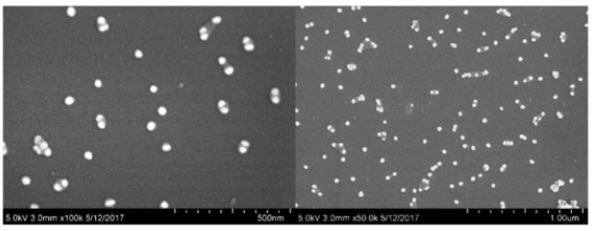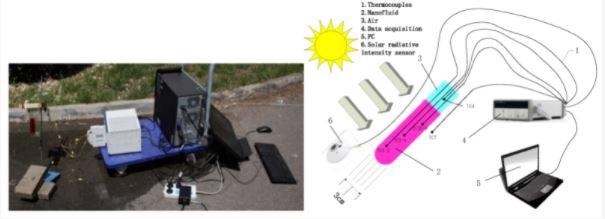Solar power has attracted significant attention as a key technology to reduce carbon emissions to net-zero In line with international policies. Researchers in the field of solar power are constantly investigating ways to improve the technology, and now a paper published in the journal Energies has investigated the advantages of hybrid nanofluids over single nanofluids for solar energy transfer.

Experimental Research on the Selective Absorption of Solar Energy by Hybrid Nanofluids. Image Credit: lovelyday12/Shutterstock.com
Improving the Efficiency of Solar Power
Solar energy is a clean, renewable, and inexhaustible source of power generation and harvesting. As the world moves away from environmentally damaging fossil fuels, the need to improve the efficiency of solar technologies is a consistent research concern.
Studies have focused on enhancing the properties of materials used to trap solar energy and convert it into an electrical charge and designing more efficient components of solar cells.
In energy harvesting and power generation applications, heat energy can be absorbed in a solar collector, which contains fluid, to convert solar energy. The solar collector’s efficiency is related to the fluid’s absorptivity. Whilst improving the efficiency of solar power and therefore improving its commercial and industrial uptake is still challenging, recent research has provided innovative solutions to address these challenges.

TEM images of Au nanofluids. Image Credit: Jin, X et al., Energies
Nanofluids
In a nanofluid, nanoparticles such as metallic nanoparticles, non-metallic nanoparticles, and nanotubes are dispersed in a liquid such as water, oil, or alcohol which acts as a heat transfer medium.
Dispersing nanoparticles in a liquid heat transfer medium creates a stable and uniform medium that possesses enhanced thermal conductivity. Nanofluids are an innovative nanotechnology application in the field of thermal engineering. Nanofluids possess Brownian motion and the small size of nanoparticles has an advantageous effect, which gives them strong suspension ability and enhanced thermal transport performance.
Using Nanofluids for Photovoltaic Applications
Due to their enhanced properties, numerous studies have proposed the use of nanofluids in the circulating medium of solar collectors for direct absorption and heat energy generation in photovoltaic solar harvesting systems.
In a traditional solar thermal collector, solar energy is absorbed by the solid surface, which is coated with materials that have high absorption properties. The working fluid within the collector then transfers the energy via thermal conduction. Direct absorption solar collectors have been explored in recent years.

SEM images of Au nanofluids. Image Credit: Jin, X et al., Energies
In this type of solar collector, the nanoparticles in the working fluid absorb solar energy volumetrically, compared to absorbing them through the engineered surface. The working fluid traps solar energy.
Volumetric absorption addresses limitations inherent to surface heat transfer, significantly increasing photothermal conversion efficiency. This is brought about by the selection of the absorption spectrum. In recent years, both metallic and carbon nanoparticle-based nanofluids have been investigated for photovoltaic heat transfer and energy generation purposes. It has been observed that characteristics such as nanoparticle size and volume concentration affect solar harvesting efficiency.

Experimental Setup and diagram of the experimental setup. Image Credit: Jin, X et al., Energies
Recent studies have indicated that noble-metal nanoparticles possess higher absorptivity in the visible light range than non-metallic nanoparticles. One example is gold, which due to its plasmon resonance characteristics shows superior absorptivity.
The absorption peak of this noble metal is concentrated at 520nm. Once the wavelength goes beyond 600nm, the gold nanofluid’s efficiency decreases. Research has indicated that solar energy absorptivity efficiency can be improved by mixing nanoparticles in nanofluids.
Investigating Hybrid Nanofluids
Whilst there have been indications that the properties of hybrid nanofluids show enhanced solar energy absorption compared to single nanoparticle nanofluids, there is a lack of research focus. Most recent studies have concentrated on single nanoparticle nanofluids' heat absorption efficiency in direct absorption solar collectors. The study in Energies has sought to change this by presenting a review of current research into the enhanced properties of hybrid nanofluids for photovoltaic applications.
One recent study that has demonstrated the enhanced properties of hybrid nanofluids was performed in 2015 by Zhang et al. In this study, the photothermal characteristics of various nanoparticles such as diamond, gold, and silicon were experimental studies.
The study discovered the addition of nanoparticles greatly improved the conversion efficiency of the fluid. The authors concluded that hybrid nanofluids displayed greater conversion efficiency at a certain mass concentration.
One conclusion that the authors have drawn is that hybrid nanofluids do not necessarily display stronger light-to-heat conversion characteristics than single nanoparticle nanofluids. Therefore, there is a need to select nanoparticles with different absorption spectra to improve the photovoltaic energy harvesting characteristics of hybrid nanofluids.
The study has identified that further research is needed on using hybrid nanofluids as solar energy collector working fluids. However, the research provides a significant knowledge base for future research in the field.
Further Reading
Jin, X et al. (2021) Experimental Research on the Selective Absorption of Solar Energy by Hybrid Nanofluids [online] Energies 14(23) | mdpi.com. Available at:
Disclaimer: The views expressed here are those of the author expressed in their private capacity and do not necessarily represent the views of AZoM.com Limited T/A AZoNetwork the owner and operator of this website. This disclaimer forms part of the Terms and conditions of use of this website.